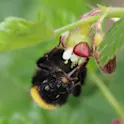1,071 news posts

Frontiers news
26 Jun 2023
Sustainable computing and net-zero energy centers: World Economic Forum emerging technologies report
As a World Economic Forum platform partner, Frontiers is collaborating with the Forum on the 2023 edition of its annual emerging technologies report. Chosen by an international panel of experts, the list of top ten emerging technologies included in the report were selected from nearly 100 contenders based on criteria including novelty, applicability, depth, and power. Credit: Frontiers Sustainable computing and net-zero energy centers Data centers, which account for an estimated 1% of global electricity consumption, are a growing contributor to the worsening environmental crisis. New approaches, which address this problem, have been identified among the top ten technologies listed in this year’s World Economic Forum report. Andrew Maynard, one of the report’s authors and member of the Forum’s steering committee for the project, said: “Given the growing global demand for data centers, technologies designed to ‘green’ the computing industry will increase in importance over coming years. The inclusion of sustainable computing in this year’s report highlights the need for technologies to control and optimize energy consumption in computing.” Innovative, sustainable solutions in this area bring together multiple technologies to improve energy efficiency, including liquid cooling systems and repurposing excess heat. Creative approaches are also being used to integrate and […]

Frontiers news
26 Jun 2023
‘Wearable’ sensors for plants: World Economic Forum emerging technologies report
As a World Economic Forum platform partner, Frontiers is collaborating with the Forum on the 2023 edition of its annual emerging technologies report. Chosen by an international panel of experts, the list of top ten emerging technologies included in the report were selected from nearly 100 contenders based on criteria including novelty, applicability, depth, and power. Credit: Frontiers “Wearable” sensors for plants To feed the world’s population in 2050, food production must increase by 70%, according to the U.N. Food and Agriculture Organization. To achieve this, agricultural innovation will be crucial, and technology is a key element of this. Recent advances in crop monitoring, including the use of sensor-equipped drones and tractors alongside low-resolution satellite data, have helped farmers by increasing the scale of crop monitoring. However wearable plant sensors will take this monitoring to a new level, and it is this area of innovation which has been highlighted in the 2023 World Economic Forum emerging technologies report. Wearable plant sensors are small devices that can attach to crop plants to continuously monitor temperature, humidity, moisture, and nutrient levels. This data can optimize yields, reduce waste, detect early signs of disease and minimize the environmental impact of agriculture. Although challenges […]

Frontiers news
26 Jun 2023
Kate Soper – The growth agenda is no longer feasible. What is the alternative?
Author: Sorcha Brennan Kate Soper is emerita professor of philosophy and a former researcher with the Institute for the Study of European Transformations at London Metropolitan University. She had a long association with Radical Philosophy and was a regular columnist for the US-based journal, Capitalism, Nature, Socialism. She has also been an editorial collective member and writer for New Left Review. She is a translator, among others, of Sebastiano Timpanaro, Noberto Bobbio, Michel Foucault, Cornelius Castoriadis, and Carlo Ginzburg. Her own books include: On Human Needs: open and closed theories in a Marxist Perspective; Humanism and Anti-Humanism; Troubled Pleasures: Writings on Politics, Gender and Hedonism; What is Nature? Culture, Politics and the Non-Human. She has been involved in a number of research projects on climate change and sustainable consumption, most recently as a Visiting Fellow at the Dubendorf Institute, Lund University, Sweden. Her most recent book is Post-Growth Living: For an Alternative Hedonism. Photo credit: Jo Mortimer You have written and published on the theory of need and environmental philosophy for many years. Your 2020 book Postgrowth Living: For an Alternative Hedonism published by Verso is an intersectional continuation of these themes. How has your past scholarship and formation as a researcher led you to this juncture of post-consumption and the politics of pleasure? “Well, the most immediate impetus […]

Featured news
22 Jun 2023
Space travel alters gene expression in white blood cells, weakening our immune system
By Mischa Dijkstra, Frontiers science writer Scientists have shown that the expression of (mostly protein-coding) genes in white blood cells changes rapidly when astronauts reach the International Space Station. This may explain why astronauts appear more susceptible to infectious diseases while in space. Most genes returned to their typical pre-flight level of expression within a few weeks to one year after landing, suggesting that Earth-level gravity is required for the immune system of astronauts to function optimally Evidence is mounting that astronauts are more susceptible to infections while in space. For example, astronauts on board the International Space Station (ISS) commonly suffer from skin rashes, as well as respiratory and non-respiratory diseases. Astronauts are also known to shed more live virus particles, for example Epstein-Barr virus, varicella-zoster responsible for shingles, herpes-simplex-1 responsible for sores, and cytomegalovirus. These observations suggest that our immune system might be weakened by space travel. But what could cause such an immune deficit? “Here we show that the expression of many genes related to immune functions rapidly decreases when astronauts reach space, while the opposite happens when they return to Earth after six months aboard the ISS,” said Dr Odette Laneuville, an associate professor at the […]

Frontiers news
21 Jun 2023
Frontiers to partner with major global symposium on protein and human health
Gold open access publisher Frontiers will be the publishing partner for a scientific summit meeting later this year on protein and human health, sponsored by the Food and Agriculture Organization (FAO) of the United Nations (UN). Organized in collaboration with the International Atomic Energy Agency (IAEA) Wageningen University and Research, and the Riddet Institute, Massey University, the symposium will take place in September 2023 in Utrecht. It follows on from a previous landmark meeting on the same topic in 2011, which brought together international experts to give an unprecedented overview of global knowledge and perspectives on protein nutrition and metabolism. The upcoming summit will provide an update on contemporary issues relating to protein nutrition and human health and seeks to foster debate on the role of protein in the human diet and the sustainability of protein food production. As publishing partner for the symposium Frontiers in Nutrition will publish a special research topic based on articles from researchers invited to speak at the event. Both the FAO and IAEA place great importance on the peer-reviewed scientific literature from the symposium being open-access and freely available to the broader scientific community, particularly those from low- and middle-income countries. Johannes le Coutre, […]

Featured news
20 Jun 2023
Machine learning helps researchers identify hit songs with 97% accuracy
By Deborah Pirchner, Frontiers science writer Image: Shutterstock.com Predicting hit songs is notoriously difficult. Researchers have now applied machine learning (ML) to high-frequency neurophysiologic data to improve hit song prediction accuracy. They showed that if ML was applied to neural data collected while people listened to new music, hit songs could be predicted with close-to-perfect accuracy. This can open doors to providing consumers with the entertainment they are looking for, rather than flooding them with options. Every day, tens of thousands of songs are released. This constant stream of options makes it difficult for streaming services and radio stations to choose which songs to add to playlists. To find the ones that will resonate with a large audience, these services have used human listeners and artificial intelligence. This approach, however, lingering at a 50% accuracy rate, does not reliably predict if songs will become hits. Now, researchers in the US have used a comprehensive machine learning technique applied to brain responses and were able to predict hit songs with 97% accuracy. “By applying machine learning to neurophysiologic data, we could almost perfectly identify hit songs,” said Paul Zak, a professor at Claremont Graduate University and senior author of the study […]

Environment
15 Jun 2023
How antelopes under threat from the climate crisis have responded to rising temperatures
by Angharad Brewer Gillham, Frontiers science writer Image: Benjamin Hollis/Flickr, CC BY 2.0 The rising temperatures of the climate crisis threaten wildlife around the world. Scientists studying three common species of antelope in Namibia found that they generally reduced or changed the timing of activity to cope with heat stress, but the smaller and more active antelopes were most affected. In the future, heat stress could drive significant changes to the animal composition of this habitat. The climate crisis is turning the temperature up all over the world, but in southern Africa, the rise has been particularly concerning. Wild animals dependent on delicate ecosystems which are already dry, so that food and water scarcity limits their ability to cope with increased heat, are at serious risk. Scientists studied the behavior of three different species of antelope with overlapping ranges in Namibia to try to understand how animals of different sizes and behaviors adapt to the heat. “Even the indigenous wildlife, adapted to hot and arid conditions, shows sensitivity to extreme heat,” said Paul Berry of the University of Potsdam, lead author of the study in Frontiers in Ecology and Evolution. “We need to consider the possibility that additional anthropogenic influences […]

Featured news
14 Jun 2023
Slightly lost bumblebees use scent to find their way home
By Mischa Dijkstra, Frontiers science writer Researchers have shown that returning foragers of buff-tailed bumblebees use their own passively laid out scent marks, as well as visual information from landmarks, to find their way back to the nest entrance. These results highlight the importance of both vision and odor for guiding the navigation of bumblebees Put yourself in the exoskeleton of a bumblebee for a moment: your world would be a riot of colors and scents, both essential to guide your search for pollen and nectar. Bumblebees have excellent vision: they have a pair of compound eyes that can distinguish UV and most colors except red, plus three additional simple eyes specialized in detecting polarized light. Their sense of smell dwarfs ours: approximately 100 times more sensitive, and capable of sniffing out illegal drugs or explosives at airports, confirming pregnancy in women, or detecting cancers and diabetes in early-stage patients. Now, researchers have shown that bumblebees can also use their sense of smell to locate their nest. This is especially important when the landscape suddenly changes, for example when familiar visual landmarks are blown away by wind. The results are published in Frontiers in Behavioral Neuroscience. “Here we show that […]

Frontiers news
12 Jun 2023
Sangeeta Mangubhai – We need to break the glass ceilings
By Thimedi Hetti Photo credit: Emily Darling The United Nations Sustainable Development Goal 14: Life Below Water is about aiming to conserve and sustainably use the oceans, seas, and marine resources for sustainable development. In honor of both SDG 14 and World Ocean Day this month, I spoke to Dr Sangeeta Mangubhai, principal consultant and research scientist at Talanoa Consulting. Sangeeta has a PhD in coral reef ecology with 25 years’ worth of experience working on environmental issues. Originally from Fiji, she has worked in Australia, East Africa, Indonesia, and the South Pacific on natural resource management, coastal fisheries, “blue foods”, payment for ecosystem services, value chains, gender, protected areas, environmental policy, disaster, and climate change. Sangeeta is a 2018 Pew Fellow working on mainstreaming gender and human rights-based approaches into coastal fisheries in Melanesia. What was it like growing up in Fiji? “We spent a lot of time in nature, enjoying the outdoors with family and friends. It’s fascinating to think back to a time without TV or social media, when life was much simpler in Fiji. We spent a lot of time swimming in the sea. As a special treat, my dad would take us out snorkeling. We […]

Featured news
09 Jun 2023
New high-tech helmets may protect American football players from debilitating concussions
by Angharad Brewer Gillham, Frontiers science writer Image/Shutterstock.com Evidence is mounting that head impacts in American football can lead to devastating neurological illness. Scientists searching for ways to protect players have developed a helmet containing liquid shock absorbers that cuts the impact of blows to the head by a third compared to existing models. Millions of people in the US are concussed every year playing sports. Players of games like American football are at particularly high risk for injuries that can have devastating long-term consequences. Stanford University scientists working with the company Savior Brain have now designed one potential way of protecting players: a helmet containing liquid shock absorbers that could reduce the impact of blows to the head by a third. “Most of the members of our team have a personal connection to traumatic brain injury and we care deeply about ensuring long-term athlete brain health,” said Nicholas Cecchi, a PhD candidate at Stanford University and lead author of the study in Frontiers in Bioengineering and Biotechnology. “Concussion and repeated head impacts are still a major problem in contact sports, and we believe that improved helmet technology can play an important role in reducing the risk of brain injury.” […]

Featured news
08 Jun 2023
Science for all with compatible AI
Watch Mirjam Eckert, chief publishing officer at Frontiers, introduce the publisher and demystify its machine learning tool. With thanks to the Gottlieb Duttweiler Institute. Photo credit: Frontiers Human compatible Artificial Intelligence (AI) could empower us all. But public trust in good science will be key. At Frontiers, we apply AI to help build that trust. Our Artificial Intelligence Review Assistant (AIRA) verifies that scientific knowledge is accurately and honestly presented even before our people decide whether to review, endorse, or publish the research paper that contains it. AIRA reads every research manuscript we receive and makes up to 20 checks a second. These checks cover, among other things, language quality, the integrity of figures and images, plagiarism, and conflicts of interest. The results give editors and reviewers another perspective as they decide whether to put a research paper through our rigorous and transparent peer review. We face global, existential threats, from health emergencies to climate change. We can manage and reverse these threats, for healthy lives on a healthy planet – with political will, global collaboration, and scientific breakthrough at a scale not yet seen. On all those counts, success will depend on the widespread sharing of the latest […]

Featured news
08 Jun 2023
Why diversity and inclusion needs to be at the forefront of future AI
by Inês Hipólito/Deborah Pirchner, Frontiers science writer Image: shutterstock.com Inês Hipólito is a highly accomplished researcher, recognized for her work in esteemed journals and contributions as a co-editor. She has received research awards including the prestigious Talent Grant from the University of Amsterdam in 2021. After her PhD, she held positions at the Berlin School of Mind and Brain and Humboldt-Universität zu Berlin. Currently, she is a permanent lecturer of the philosophy of AI at Macquarie University, focusing on cognitive development and the interplay between augmented cognition (AI) and the sociocultural environment. Inês co-leads a consortium project on ‘Exploring and Designing Urban Density. Neurourbanism as a Novel Approach in Global Health,’ funded by the Berlin University Alliance. She also serves as an ethicist of AI at Verses. Beyond her research, she co-founded and serves as vice-president of the International Society for the Philosophy of the Sciences of the Mind. Inês is the host of the thought-provoking podcast ‘The PhilospHER’s Way’ and has actively contributed to the Women in Philosophy Committee and the Committee in Diversity and Inclusivity at the Australasian Association of Philosophy from 2017 to 2020. As part of our Frontier Scientist series, Hipólito caught up with Frontiers to tell us […]

Featured news
07 Jun 2023
Science shows why our taste in music can’t be siloed into catch-all genres
By Deborah Pirchner, Frontiers science writer Image: Shutterstock.com Music genres have long been used to describe people’s musical taste. Now, a team of scientists has examined music tastes of a broad German sample and found that it is not sufficient to know what genres people like to describe their musical taste. The researchers also found certain musical tastes may be connected to specific socio-demographic and personality variables of people who like the same genres. Liking certain things or styles is an important aspect of people’s identities and social lives. Tastes can influence the ways humans act and judge. How to best describe musical taste reliably is – due to the ever-changing diversification and transformation of music – difficult and open to debate. Using an approach which also considered sub-genres, researchers in Germany surveyed more than 2,000 people on their musical taste and took a closer look at the fans of five genres: European classical music, electronic dance music (EDM), metal, pop, and rock. “Our analyses revealed that people who like the same genre can have very different tastes if asked which sub-genres they like,” said Anne Siebrasse, a doctoral student at Max Planck Institute for Empirical Aesthetics and lead author […]

Frontiers news
06 Jun 2023
Frontiers announces membership of STM
Gold open access publisher Frontiers has announced that it has become a member of the International Association of Scientific, Technical, and Medical Publishers, better known as STM. Credit: Frontiers Frontiers has been involved in various initiatives with STM over the years, and more actively last year as a member of the working group on research integrity. Frontiers has contributed to the group’s development of new paper mill detection tools, in collaboration with a number of other publishers The move to full membership is a significant step in Frontiers’ ongoing relationship with STM. It will enable the publisher to make a more substantial contribution to the association’s work, including efforts to identify potentially fabricated or manipulated research, and academic publishing policies. Stephan Kuster, head of public affairs at Frontiers, who will be the publisher’s main representative to STM said: “this new membership is a natural progression of the work we have already been doing with STM and we are looking forward to increasing our participation in a range of projects to support policy development in scholarly publishing.” Fred Fenter, chief executive editor at Frontiers, said: “This is an important time for the development of academic publishing, and we look forward to […]

Featured news
05 Jun 2023
Seeing inside a dying brain: Here are five Frontiers articles you won’t want to miss
By Deborah Pirchner, Frontiers science writer Image: Shutterstock.com At Frontiers, we bring some of the world’s best research to a global audience. But with tens of thousands of articles published each year, it’s impossible to cover all of them. Here are just five amazing papers you may have missed. What happens to the brain when we die? The mystery of what happens in the brain when we die has fascinated humans for centuries. Despite understanding gained from recent studies, there still are open questions – not lastly because obtaining data about the last moments of life is difficult. Researchers largely have to rely on descriptions of near-death-experience survivors. To fill knowledge gaps, these accounts are immensely valuable. Now, in a review article published in Frontiers in Aging Neuroscience, an international team of researchers has reviewed the current knowledge on what neurophysiological changes occur in the brain during these experiences. They also examined what anatomical correlates to these changes are, and how drugs and metabolic factors are involved. Understanding the underlying neurophysiological changes in the dying human brain could be the only way to decipher the neurophysiology of death, the scientists noted. Descriptions from near-death survivors may be our only […]